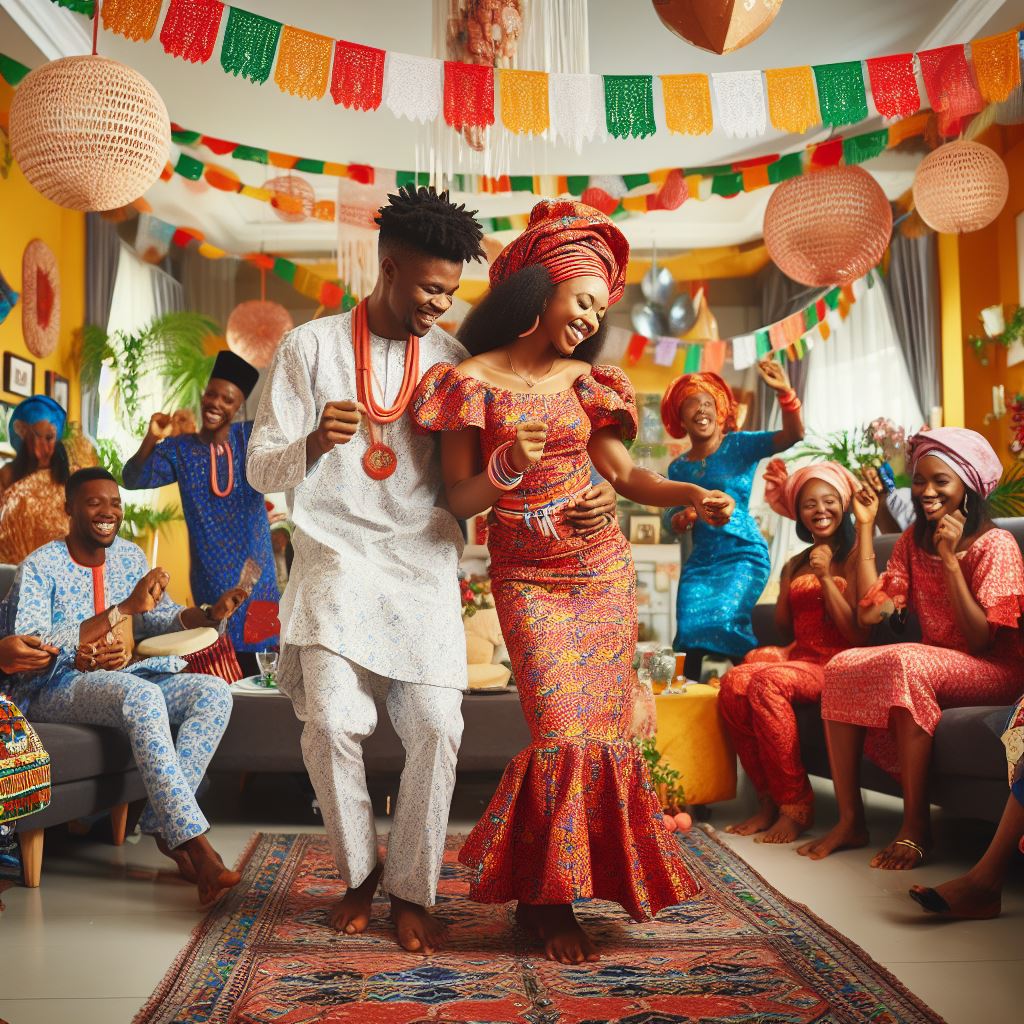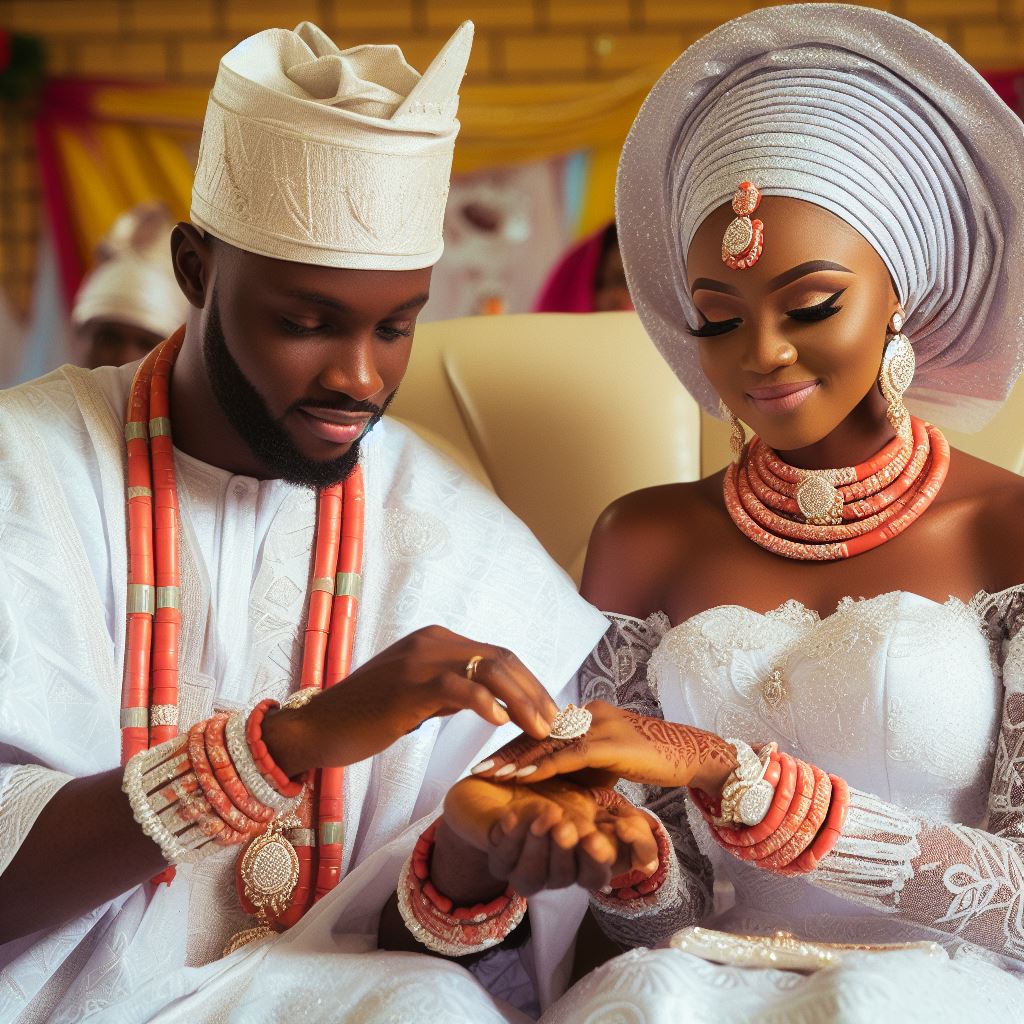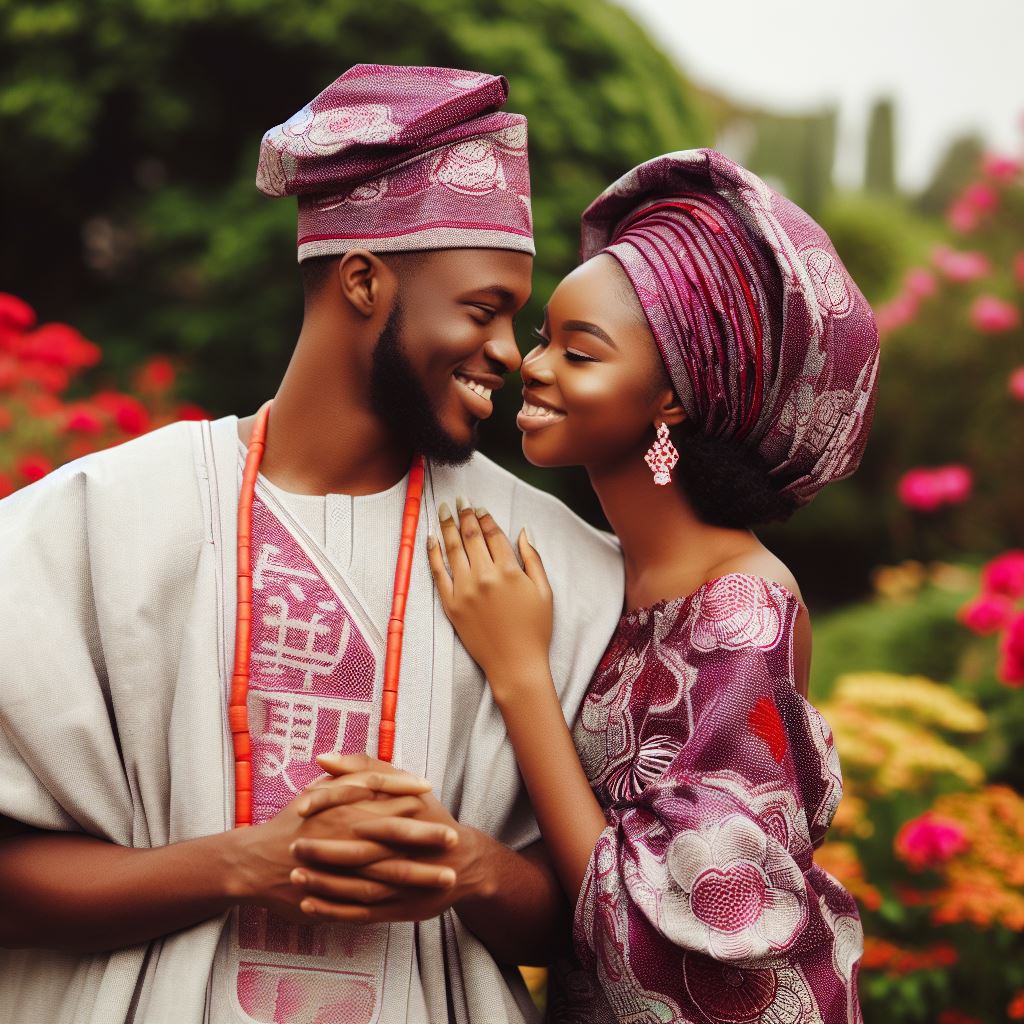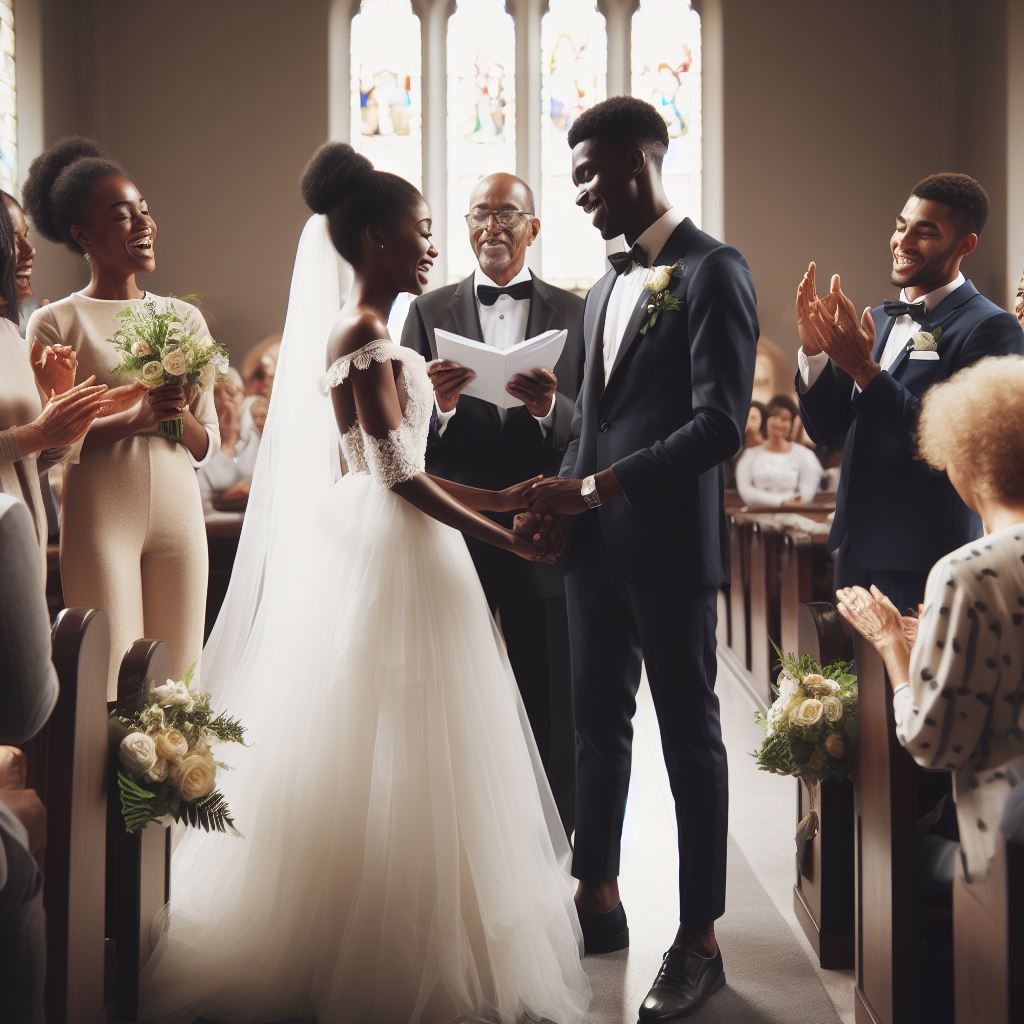Introduction
Nigeria’s rich cultural mosaic, comprising over 250 diverse ethnic groups, significantly impacts the complex institution of marriage.
Each group brings its own set of customs, traditions, and beliefs into this sacred union.
These cultural nuances, which vary from the Yoruba in the southwest to the Hausa-Fulani in the north and the Igbo in the southeast, create a vibrant kaleidoscope of marital practices.
This blog post takes a closer look at the importance of discussing gender roles within the context of Nigerian marriages.
Gender roles in Nigeria have been historically rooted in tradition, often assigning specific duties, responsibilities, and expectations to men and women.
However, as Nigeria undergoes rapid urbanization, globalization, and increased access to education, these roles are evolving.
Understanding the shifting landscape of gender roles is essential for promoting equality, respect, and mutual understanding within Nigerian marriages.
It’s not just an academic endeavor; it’s a practical necessity for couples navigating the modern challenges and opportunities of Nigerian society.
In this exploration, we aim to shed light on how these roles are changing and offer insights into how individuals and couples can navigate this evolving terrain for happier and healthier unions.
Traditional Gender Roles in Nigerian Marriage
Description of the traditional gender roles assigned to men and women
- Men are expected to be the providers and protectors of the family.
- They are typically the breadwinners, responsible for financially supporting their households.
- Men are also regarded as the head of the family, making important decisions.
- They are expected to be strong, assertive, and authoritative in their roles as husbands and fathers.
- Emotionally, men are often encouraged to be stoic and suppress their feelings.
- Women, on the other hand, are primarily responsible for the domestic duties.
- They are expected to be nurturing caregivers, taking care of the children and the home.
- Women are often seen as submissive to their husbands and are expected to prioritize their needs.
- They are encouraged to be modest, respectful, and obedient in their roles as wives and mothers.
- Traditionally, women were not expected to pursue careers outside of the home.
Influence of cultural and religious beliefs on gender roles
- Nigeria’s diverse cultural and religious beliefs play a significant role in shaping gender roles.
- Many Nigerian cultures emphasize the importance of respect for elders and traditional values.
- These cultural beliefs often reinforce gender roles and expectations within marriages.
- Religion, particularly Islam and Christianity, also plays a significant role in defining gender roles.
- Religious teachings and interpretations may reinforce traditional gender roles or challenge them.
Examples of specific gender roles for men and women in Nigerian society
- Men are expected to provide financially for their families.
- They are responsible for making important decisions, such as those regarding their children’s education.
- Men often take on more public roles and are encouraged to pursue careers and leadership positions.
- Women are expected to prioritize their families and provide emotional support.
- They play a key role in raising children and are often responsible for managing the household finances.
- Women may also engage in income-generating activities, but their primary focus is still on their families.
Basically, traditional gender roles in Nigerian marriage assign specific responsibilities to men and women.
Men are expected to be providers and leaders, while women are primarily responsible for domestic duties.
These gender roles are influenced by cultural and religious beliefs, which can either reinforce or challenge them.
Despite evolving societal expectations, many Nigerians still adhere to these traditional gender roles.
Understanding these roles is essential in analyzing the dynamics of Nigerian marriages and finding ways to promote gender equality and empowerment.
Read: Marriage Expectations: From Singlehood to Matrimony in Nigeria
Contemporary Perspective on Gender Roles in Nigerian Marriage
Shift in gender roles due to globalization and modernization
Nigerian society is undergoing a transformation, driven by globalization and modernization.
These forces have challenged traditional gender roles and ushered in new dynamics within marriages.
Previously, men were expected to be the primary breadwinners while women took on domestic responsibilities.
However, the advent of modern technologies and increased access to education have opened up economic opportunities for women.
This shift has led to a redefining of gender roles, as women are now more involved in financial decision-making and contributing to the family’s income.
Many women are pursuing careers and successfully balancing work and family life.
Factors contributing to the changing roles of men and women
Several factors have contributed to the changing roles of men and women in Nigerian marriages.
Educational opportunities have expanded, allowing more women to pursue higher education and develop professional skills.
This has empowered them to challenge traditional gender roles and pursue careers.
Furthermore, economic factors have played a significant role.
With the rising cost of living, it has become necessary for both partners to contribute financially to the household.
This has necessitated a more flexible approach to gender roles.
Social awareness campaigns and advocacy for gender equality have also contributed to the changing roles.
These efforts have challenged stereotypes and encouraged a more progressive mindset regarding gender roles within marriages.
Examples of how gender roles have evolved in recent years
Recent years have witnessed notable changes in gender roles within Nigerian marriages.
Women are increasingly taking on leadership positions in various fields, including politics, business, and academia.
Men, on the other hand, are becoming more involved in household chores and responsibilities.
They are actively participating in child-rearing tasks and sharing domestic duties with their partners.
Furthermore, more couples are making joint decisions regarding important matters, such as finances, parenting, and career choices.
This signifies a shift towards a more egalitarian approach to marriage.
Additionally, societal attitudes have become more accepting of non-traditional gender roles, fostering an environment where individuals feel empowered to break free from rigid expectations.
Generally, the contemporary perspective on gender roles in Nigerian marriages demonstrates a shift away from traditional norms.
Globalization, modernization, increased education, and changing economic factors have contributed to this evolution.
The changing roles of men and women in recent years indicate a more balanced and equitable distribution of responsibilities within Nigerian marriages.
Read: The Dynamics of Christian Marriages in Contemporary Nigeria

Gain More Insights: Inter-State Marriages: Certificates and Legalities
Challenges and Controversies Surrounding Gender Roles in Nigerian Marriage
Resistance to change from traditionalists and conservative groups
- Traditionalists and conservative groups in Nigeria often resist changes in gender roles within marriages.
- These groups believe that maintaining traditional gender roles is essential for preserving cultural values.
- They argue that any deviation from these roles can lead to societal breakdown and moral decay.
- Resistance to change often manifests in opposition to women’s empowerment and increased decision-making power.
- Traditionalists and conservative groups fear that redefining gender roles will undermine gender dynamics and family structures.
Conflicts arising from conflicting expectations between partners
- The shift in gender roles can create conflicts and tensions between partners who hold differing expectations.
- Traditional gender roles dictate that men should be the primary breadwinners, while women focus on domestic responsibilities.
- However, with changing times, women are seeking more financial independence and equal decision-making power.
- Conflicts arise when partners have contrasting expectations regarding their roles and responsibilities.
- Negotiating and finding a balance between traditional expectations and modern desires can be challenging for couples.
Impact of gender roles on marital satisfaction and individual fulfillment
- The adherence to traditional gender roles can affect marital satisfaction and individual fulfillment.
- Women who are expected to fulfill traditional roles may feel limited in their personal growth and autonomy.
- Men who are burdened with the sole responsibility of being the breadwinners may experience immense pressure.
- Imbalance in gender roles can lead to resentment, unfulfilled expectations, and strained relationships.
- Achieving marital satisfaction and individual fulfillment often requires redefining gender roles based on equality and mutual understanding.
Essentially, the challenges and controversies surrounding gender roles in Nigerian marriages continue to persist.
Resistance from traditionalists and conservative groups, conflicts arising from conflicting expectations, and the impact on marital satisfaction and individual fulfillment are significant issues to address.
It is crucial to engage in open dialogues and create a society that embraces equality and respects individual choices within the context of marriage.
Read: The Evolution of Marriage Definitions in Nigerian Cultures
Balance and Equality in Nigerian Marriage
Importance of achieving balance and equality in gender roles
- A balanced and equal distribution of gender roles in marriage promotes harmony and reduces conflicts.
- It allows both partners to contribute their skills and abilities, leading to a more efficient and fulfilling relationship.
- Achieving balance and equality in gender roles challenges traditional norms and promotes social progress.
Benefits of equitable distribution of responsibilities between spouses
- Shared responsibilities create a sense of shared ownership and strengthen the bond between spouses.
- Equally distributed tasks enable both partners to explore their potential and grow individually.
- It prevents gender-based discrimination and improves overall well-being within the marriage.
Strategies for promoting fair gender roles in marriages
- Educating individuals about the importance of balance and equality in marriage through workshops and awareness campaigns.
- Encouraging open communication and dialogue between spouses to discuss and negotiate responsibilities.
- Challenging traditional gender stereotypes and encouraging flexibility in gender roles.
- Promoting equal opportunities for education and employment to empower individuals to contribute equally.
- Supporting policies and laws that promote gender equality and protect individuals from discrimination.
By promoting balance and equality in gender roles, Nigerian marriages can thrive and contribute to a more inclusive society.
Read: Marriage Rites and Celebrations in Major Nigerian Tribes
Conclusion
Recap of the Nigerian perspective on gender roles in marriage
Traditional gender roles in Nigeria’s marriages deeply embed men as breadwinners and women as homemakers.
Societal expectations and cultural norms, handed down through generations, shape this perspective.
Society expects men to dominate and lead, while it expects women to nurture and be submissive.
However, there is a growing movement towards redefining and challenging these traditional gender roles in Nigerian society.
Many young Nigerians are advocating for more equality, flexibility, and partnership in their marital relationships.
Importance of ongoing dialogue and understanding in redefining gender roles
To redefine gender roles in marriage, ongoing dialogue and understanding between partners are crucial.
Couples need to have open and honest conversations about their expectations, desires, and goals.
They should strive for mutual respect, support, and the ability to make decisions together as a team.
This dialogue can help break down stereotypes and promote a more equal and fulfilling partnership.
Encouragement for readers to share their own experiences and perspectives on the topic
It is important for readers to share their own experiences and perspectives on gender roles in marriage.
By sharing diverse stories and ideas, we can broaden our understanding and challenge existing norms.
Through these discussions, we can work towards creating a more inclusive and equitable society for all.




